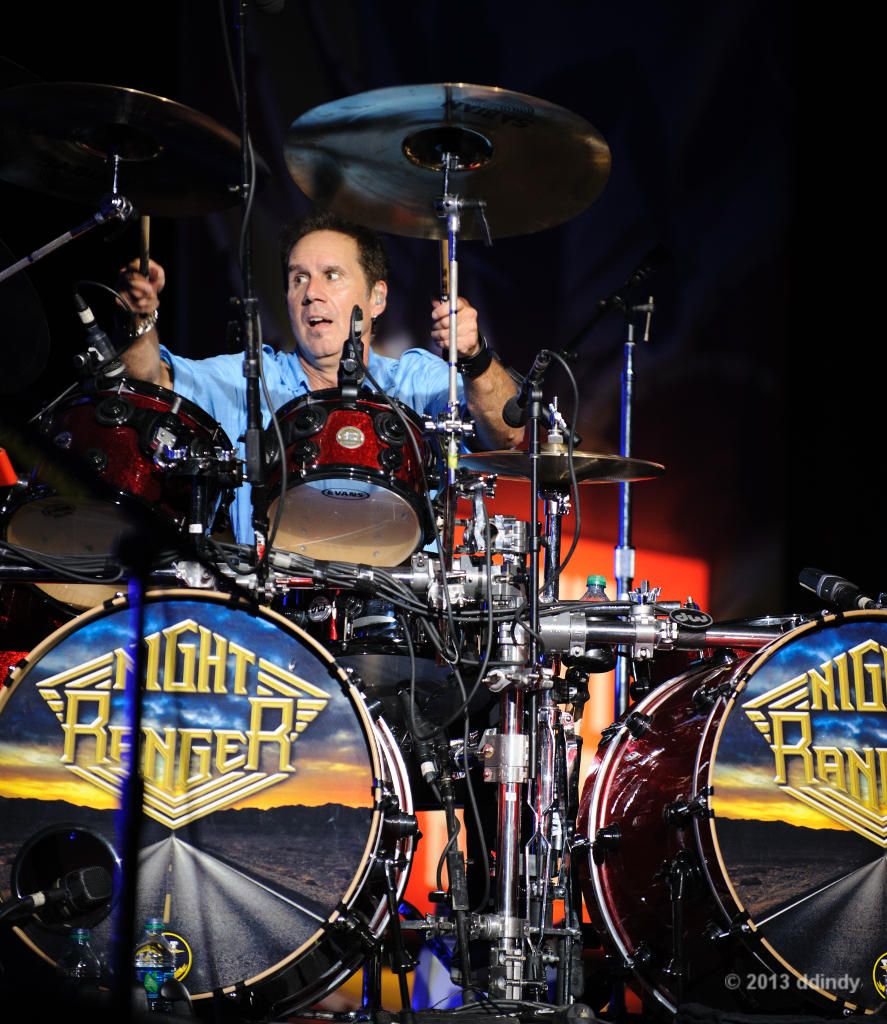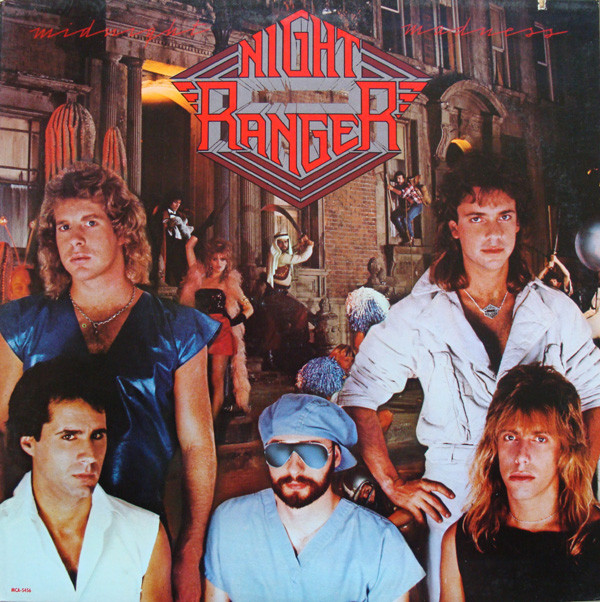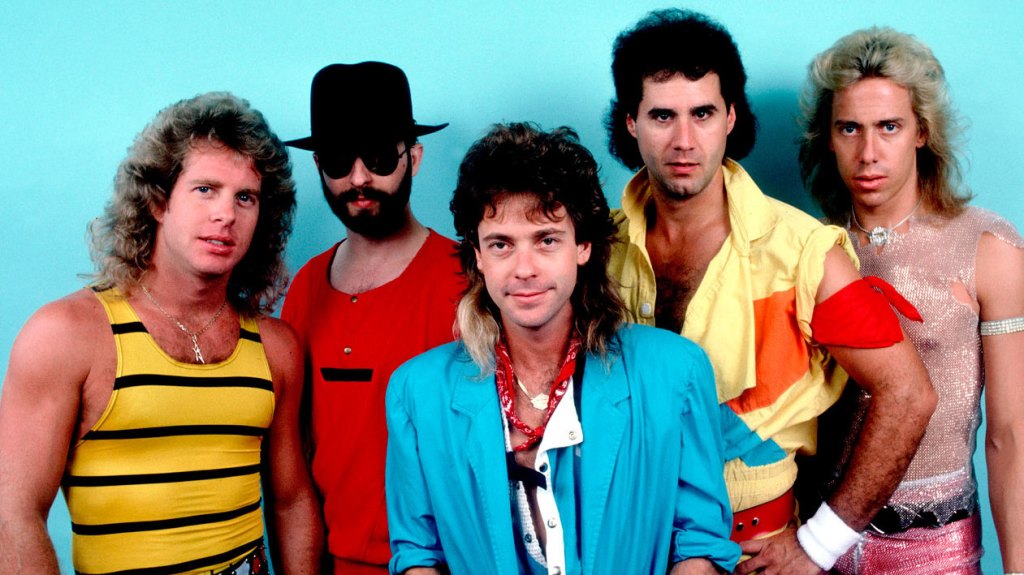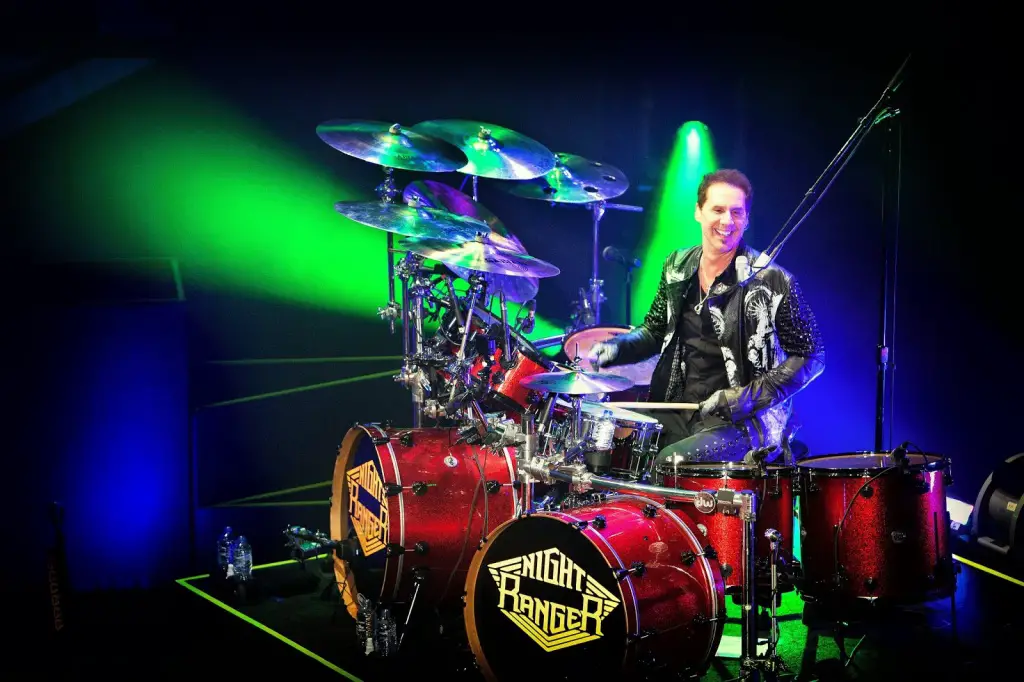All images courtesy of Freeman Promotions

It’s been 42 years since the earliest incarnation of Night Ranger first launched.
However, navigating an altered musical landscape, the band incredulously continues to forge ahead and create despite being three decades removed since the heyday of its genre. Night Ranger remained diligent in coming up with fresh material throughout the pandemic, and last week, the band released its 13th studio album, ATBPO.
With Jack Blades, Brad Gillis, and Kelly Keagy — three of the core co-founders — remaining at the forefront, Night Ranger returned to its roots on ATBPO, providing their signature vocal hooks and fiery dual guitar work throughout the 12-track album.
ATBPO was released via Frontiers Music Srl on August 6th.
I recently caught up with Night Ranger drummer Kelly Keagy to discuss the band’s latest effort.
Andrew:
Pleasure to speak with you, Kelly, and congrats on the new album. To start things off, what inspired the album title ATBPO?
Kelly:
Well, the idea kind of got started during the whole lockdown. Everybody was really worried about if we were ever gonna go back to work or ever gonna be able to be creative and be in a room together. We did the whole album over the internet, phone calls, and Zoom and it was just so difficult. The whole time we kept thinking that we weren’t going to be able to do it again, so that’s where we came up with And The Band Played On and abbreviated it.
Andrew:
This is Night Ranger’s first studio album since 2017’s Don’t Let Up. How did the idea materialize?
Kelly:
Well, with all the time that we had off, we realized that we wanted to keep being creative and moving ahead. And so, that’s what we did. We said, “Well, let’s just make an album then.” So, we weren’t really planning on making an album, we were planning on letting some more time go by. We had a whole tour booked – we were supposed to do 90- some dates together with Sammy Hagar and Whitesnake — and all that went away, so we suddenly realized we had at least three months of nothing. And that was the first time we had that much time since 1982.
Andrew:
Describe the creative process for this album.
Kelly:
Once we realized that we had to start coming up with ideas and different choruses and this and that, we just started getting on the phone, knowing that we couldn’t fly and get in a room together. So, we just started to come up with chord changes; everybody was sending little clips over the internet. We got on pro tools and started to come up with tracks and stuff like that. So, it was a long process of conversations and this and that. So, that’s how we did it.

Andrew:
What was the blueprint for ATBPO? Was there a specific sound you aspired to capture?
Kelly:
We take a little from what’s going on around us and new music, but we wanted to kind of go back to our roots on this one. Basically, those great choruses that we love and wanted to continue with. That’s what we did; we just kind of started with the basics and kept it rolling. It was really difficult to make because of not being in a room together – we usually get in a room together and start playing music and jamming and that’s how we write the albums. But this was the most difficult thing to do, not having that contact and that feedback from each other while you’re sitting there together. So, it was all over phone calls and sending clips over the internet and waiting for somebody to respond.
Andrew:
Between streaming services and a drastically altered musical landscape, promoting a record would appear to be a daunting task. What are some of the challenges that bands encounter?
Kelly:
For one thing, you have to write the album, you have to get the interest from the fans; fans come first. So, that’s the difficult part, actually creating the music. Then naturally, things will take off. You hope for the best. You hope that you’ve connected with people. And that’s what it is, we just try to write for the fans and the people that have been following us for 40 years.
Andrew:
How has the response been thus far?
Kelly:
It’s been really great. We’ve been very lucky that we came up with some really good material in this situation. I think, a lot of times, when you’re under pressure, you do some of your best work. And that’s what this album is about, continuing on.

Andrew:
You’ll have to explain what it felt like taking the stage for that first show following a year of inactivity.
Kelly:
Oh my God. I mean, nervousness, which is not really the case most times. You’re pretty settled in what you do and confident. But having this much time off and really being able to rehearse – and doing maybe a three-hour soundcheck and just tightening things up that way – we were pretty nervous going into the first couple shows.
Andrew:
Night Ranger was founded in 1979 by Jack Blades, Brad Gillis, and yourself. What do you recall in regards to the band’s origins?
Kelly:
What happened was, we were playing with some of the members of Rubicon before we got with Jeff Watson and Alan Fitzgerald, the original members. We were playing some clubs around San Francisco, and Alan came in to see us play and then approached Jack, Brad, and I about maybe putting together another outfit with Jeff Watson. And so, we kind of liked that idea of having two guitar players and two singers. So, we just kind of went into a jam session and decided to make it a band after we met Jeff and Alan. We immediately started to write songs in that first couple of rehearsals and it just took off from there. We just really enjoyed playing together and writing together. So, basically, it started with Alan Fitzgerald coming to see us play live.
Andrew:
The band was originally called Stereo, so where exactly was the name Night Ranger derived from?
Kelly:
Well, originally, we put names in a hat and we drew names out. Originally, somebody had the name Ranger, which I thought, “That didn’t sound like a great name to me.” But at the same time, that was the name that got chosen from that particular way we did it. So, we went with the name Ranger, but somebody already had the name. So, we had to change the name after we recorded the album and there were like 10,000 album covers printed with the name “Ranger” and the logo that looked pretty much like Night Ranger. So, we had to scrap that and come up with another name. We already had the song “Night Ranger” on the first album, so it wasn’t meant to be a specific song by any means, but it turned out to be the only name that we could actually go with that everybody liked.

Andrew:
You’ve obviously been a longtime drummer, but what prompted the plunge into singing?
Kelly:
You know, I learned both of them at the same time When I was seven years old I started playing. Back then, it was just something I gravitated towards. My older brother would play Elvis records and stuff like that, then The Beatles came out and stuff like that. You know, Richie Valens, Buddy Holly — I grew up with all of those old 50s records being played in the house. So, I learned how to sing, and when I got a chance to actually play an instrument, it was just to accompany my friend who lived across the street that was learning how to play guitar and learning songs from a songbook. Then I just started to sing and play at the same time.
Andrew:
“Sister Christian” is perhaps the most beloved song of the Night Ranger catalog and still receives regular radio play to this day. You contributed both the lyrics and vocals on this particular track, so what can you tell me about the origins of the song?
Kelly:
What happened was, I went and visited my sister up in Oregon. She was in high school and as a big brother, I wanted to send a message to her about when you’re growing up, you’re going to be presented with situations and it’s all about how you’re gonna handle it. And I think that’s where the original idea came from; you’re motoring; you’re moving through life. How are you gonna handle it? What’s gonna happen? So, it was a big brother kind of cautioning, like watch out – boys, drugs, criminals, all that kind of stuff. So, it was a basic idea. I had the chorus, “You’re motoring/What’s your price for flight?” And then I didn’t have any verse lyrics. It was like, “Sister Christy … blah, blah, blah.” I didn’t have anything. And Jack was like, “What are you singing there?” I said, “I don’t have anything. I just have Sister Christy.” And he goes, “Oh, I thought you were saying, Christian.” Then we all kind of had the bubble and it was suddenly like, “A-ha! That’s a good title. Let’s use it.” So, it went from there.
Andrew:
The song remains among the most iconic of its genre and has undoubtedly stood the test of time. It’s also been featured in movies such as Boogie Nights and Friday the 13th.
Kelly:
It’s amazing. We were so lucky. And the thing is, too, is that it can be a curse or it can be a blessing. But it was both. It was like we were established as a Rock band, but when we released that as the second single on the second album, it just exploded. We were fortunate, but at the same time, then when we went to 7 Wishes, the next album, they wanted to release those – like on 7 Wishes, they released “Sentimental Street” for the first single. So, we were kind of stuck in a trick bag there of people saying, “Oh, they’re just gonna release a ballad.” Well, that wasn’t our idea. We never thought of that. We were a Rock band first, you know? But we’re very grateful that it did take off and it did explode because it established us out there as good songwriters and a good Rock band. So, it was a blessing.

Andrew:
You and Brad Gillis forged a friendship that has spanned over 40 years. How has the chemistry developed over the years?
Kelly:
Well, I think that we’ve always been able to communicate with each other. I think that’s the breakdown that some bands have, is that if you have opinions and if you have any problems, you gotta realize that we’re a family because we grew up together. We were all right around 25 when the band was established and we kind of grew up on the road together. So, communication was a big point in keeping the band together all these years.
Andrew:
Drumming is such a physically demanding occupation, yet you continue to play at a high level after 13 albums. How have you managed to maintain peak performance?
Kelly:
Just taking care of yourself. We’re all pretty healthy and we like to work out. I use the gigs as a workout for me because you have to manage air, singing, and playing together — and playing to the level that I like to play at. So, you just have to really take care of yourself and be aware of what you’re doing. And not drink too much. [Laughs].
Andrew:
When you look back on the illustrious history of Night Ranger, how do you view the band’s legacy?
Kelly:
Well, being good songwriters and good musicians, that’s what we always wanted to be when we were young kids growing up and The Beatles were out and that whole thing. We just found inspiration in that and always wanted to be at that level. And it still continues as inspiration today, all that music that we grew up with because it was such good songwriting, good subject matter to write about. It just keeps you healthy; it keeps your brain active. I think that’s what it is, is that we just love creating together; we like playing together. And that’s how we’ve been able to stay together all these years.

Interested in learning more about Night Ranger? Check out the link below:
Be sure to check out the full archives of Shredful Compositions, by Andrew DiCecco, here: https://vinylwritermusic.wordpress.com/shredful-compositions-archives/





Leave a Reply